Ellis Davis
b. June 9th, 1927 in Helena (Arkansas)
d. September 27th, 2017 in Hot Springs (Arkansas)
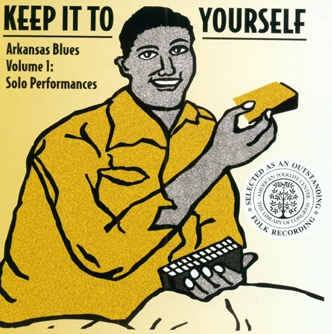
KEEP IT TO YOURSELF : ARKANSAS BLUES vol.1
Rooster
Stackhouse
March 1976
Cedell Davis grandit dans les plantations ou il semble se lier d'amitié avec le Doctor Ross durant son enfance. A 9 ans, il atteint par la polyomyélite qui le laisse partiellement paralysé. A cause de son handicap, il apprend la guitare de manière atypique. Droitier, il doit jouer essentiellement de la main gauche utilisant des accords particuliers et jouant en slide avec un canif qui lui sert de bottleneck et dont il joue par dessus le manche de la guitare. Les morceaux présents sur cette anthologie sont les premiers enregistrés par Cedell. Ils datent de mars 1976 et semblent avoir été compilés par Louis Guida. Cedell figure sur quatre beaux morceaux dont le swinguant "Let me play with your poodle" et le superbe "Big G boogie" ou il est seul à l'harmonica.
Cedell Davis grew up in plantations and he seems to befriend the Doctor Ross during his childhood. At 9 years old, he is struck down by poliomyelitis that left him partially paralyzed. Because of his disability, he learned the guitar so atypical. Right-handed, he must essentially play the left-hand using special tunes and playing slide with a penknife used as a bottleneck and he plays over the neck of the guitar. Songs in this anthology are the first recorded by Cedell. They date from March 1976 and appear to have been compiled by Louis Guida. Cedell appears on four beautiful songs to swinging "Let me play with your poodle" and the beautiful "Big G boogie" where he is alone on harmonica.
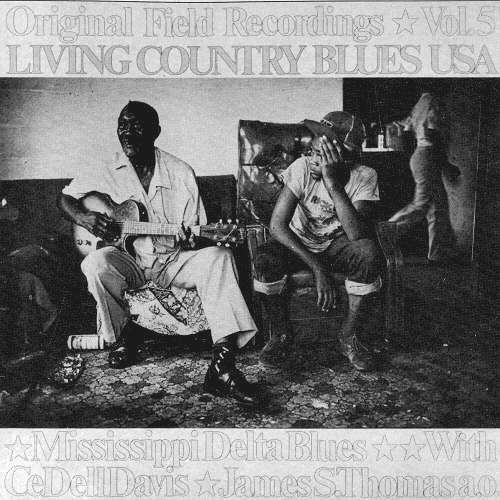
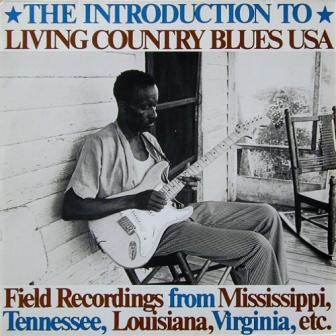
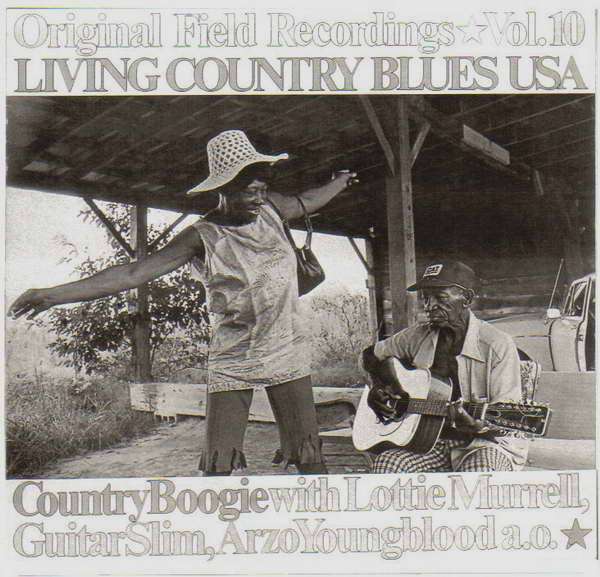
LIVING COUNTRY BLUES USA : THE INTRODUCTION, vol. 5 & 10
L+R
October 1980
Produite par Siegfried Christmann et Axel Küstner, cette remarquable série d'enregistrements de terrain a permis de faire enregistrer une génération entière de bluesmen peu connus. Cedell Davis est présent dans le volume d'introduction (1 titre) ainsi que dans les volumes 5 (4 titres) et 10 (1 titre). Ces morceaux sont tous de grande qualité notamment le magnifique "Love blues".
Produced by Siegfried Christmann and Axel Küstner, this remarkable series of field recordings allows to an entire generation of little known bluesmen to make records. Cedell Davis is present in the introductory volume (1 title) and in volumes 5 (4 titles) and 10 (1 title). These tracks are all excellent most notably the beautiful "Love blues".
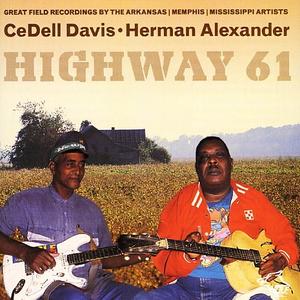
HIGHWAY 61
Wolf
November 1990
Dans cet album, son jeu de guitare se révèle vraiment chaotique et parfois superficiel (ça grince un peu partout comme dans "Room 701"). Par conséquent, la musique de Cedell pourrait déplaire à une oreille peu habituée. Il s'agit, toutefois, d'une séance de pur blues dans ce qu'il a de plus natif et dépouillé.
In this album, his guitar playing is really chaotic and sometimes superficial (squeak everywhere as in "Room 701"). Therefore, the music might displease a Cedell unaccustomed ear. It is, however, a session of pure blues in its more native and stripped style.
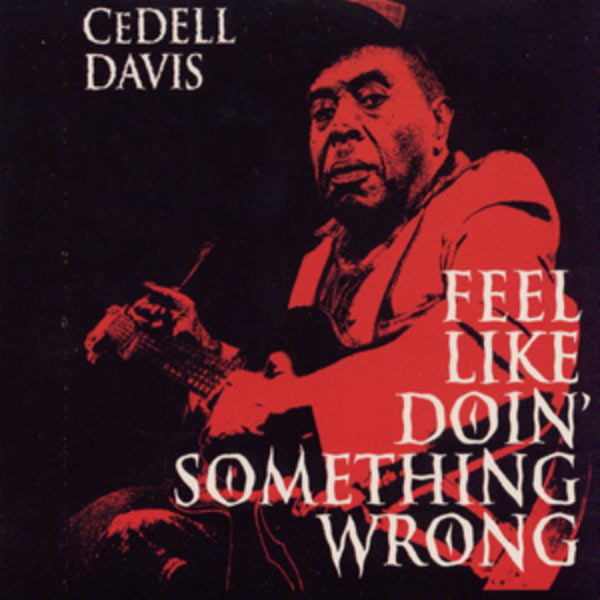
FEEL LIKE DOIN' SOMETHING WRONG
Fat Possum
1993
Influencé par Robert Nighthawk, dont il fut l'ami et le compagnon de route, Cedell participa à l'émission "King Biscuit Time" sur la radio KFFA. En 1957, il se fixe à Saint Louis avec un groupe d'amis musiciens parmi lesquels Robert Nighthawk, Sam Carr et Frank Frost. Pourtant, il reviendra vite dans son Arkansas natal (en 1961) pour ne plus en bouger. A part quelques opportunités dans les années 70 et 80, Cedell Davis devra attendre l'année 1993 pour enregistrer un disque complet à son nom. Produit par Robert Palmer, voici un album de Delta-blues brut et terrien. Le programme présenté reste constamment à un excellent niveau d'inspiration. "She's got the devil in her", "If you like fat women" et sa reprise du fameux "Boogie chillen" (avec R.L. Burnside) s'imposent comme de franches réussites ou sa technique particulière au bottleneck fait merveille. Souvent seul à la guitare, il y a, néanmoins, trois morceaux ("I don't know why", "Falling rain blues" et "Murder my baby") où Cedell est accompagné d'un petit groupe. Captés grâce à Terry Dunne (le propriétaire du club Tramps de New York où Cedell a ses habitudes depuis de nombreuses années), ils donnent un contrepoint orchestral au reste de l'album.
Influenced by Robert Nighthawk (he was his long-time friend and companion), Cedell participated in "King Biscuit Time" show on KFFA radio. In 1957, he settled in St. Louis with a group of musician friends including Robert Nighthawk, Sam Carr and Frank Frost. However, he will come back rapidly in his native Arkansas (1961) to no longer move. With few opportunities in the 70's and 80's, Cedell Davis will have to wait 1993 to record an entire disc under his own name. Produced by Robert Palmer, here is an album of raw earthy Delta blues. The set-list remains constantly excellent and inspired. "She's got the devil in her", "If you like fat women" and his cover of famous "Boogie Chillen" (with R.L. Burnside) emerge as frank success where his particular technic of bottleneck wonders. Alone at the guitar, there are, nevertheless, three tracks ("I do not know why" , "Falling rain blues" and "Murder my baby") where Cedell is accompanied by a small band. Captured by Terry Dunne (the owner of the Tramps' club in New York where Cedell went for many years), they give an orchestral counterpoint to the rest of the album.
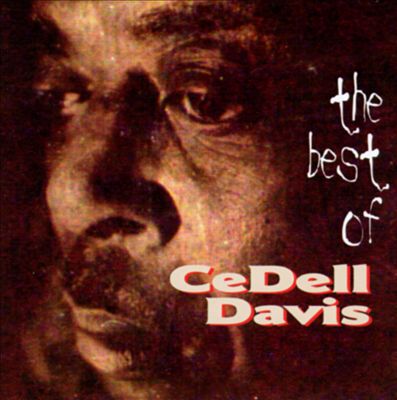
THE BEST OF CEDELL DAVIS
Fat Possum
1995
Pour cette seconde livraison pour Fat Possum, Cedell Davis est, cette fois, son propre producteur. Mais, sa musique rauque et brute n'a pas changé, toujours aussi prenante et excitante. "My dog won't stay home", "Laura Mae", "Get to steppin' baby" figurent parmi les meilleurs titres. Derrière Cedell, il y a la basse épaisse d'Oteil Barbridge et la batterie de Jeff Sipes. On note aussi la participation du jeune Derek Trucks à la guitare.
For this second installment for Fat Possum, Cedell Davis is, this time, his own producer. But, his raucous and raw music has not changed, still compelling and exciting. "My dog won't stay home", "Laura Mae", "Get to steppin' baby" are among the best titles. Behind Cedell, there is the thick bass of Oteil Barbridge and the drums of Jeff Sipes. We can also note the participation of young Derek Trucks on guitar.
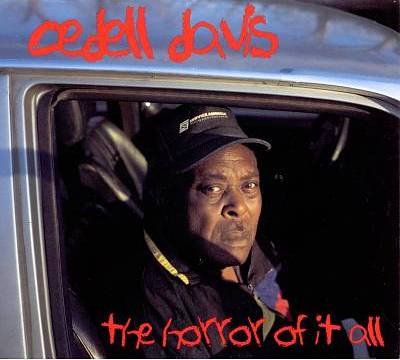
THE HORROR OF IT ALL
Fat Possum
1998
Enregistré par Robbie Norris, Matthew Johnson et Bruce Watson, ce deuxième album est dans la parfaite continuité des précédents. Son Delta-blues tranchant et chaotique ravira les amateurs du genre. Comme sur l'opus précédent, Cedell est seul à la guitare sur la plupart des morceaux (sauf deux pistes). Il y a, tout de même, un peu moins d'inspiration ici. On note quelques beaux moments comme "Chicken hawk" ou "Keep on snatchin' it back", le reste est un peu moins prenant. Autre regret : un disque un peu court qui passe tout juste les 30 minutes.
Recorded by Robbie Norris, Matthew Johnson and Bruce Watson, this second album is in perfect continuity with the previous ones. His raw and chaotic Delta blues will certainly please hardcore fans. As in the previous album, Cedell is alone with his guitar on most songs (except for two tracks). There is, nevertheless, a little less inspiration here. There are some beautiful moments as "Chicken hawk" or "Keep on snatchin' it back", the rest is a little less demanding. Another regret : a little short CD which just passes 30 minutes.
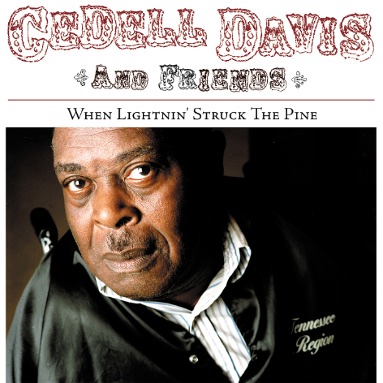
WHEN LIGHTNIN STRUCK THE PINE
Fast Horse
Sunyata
2002
Produit par Joe Cripps pour Fast Horse avec un son épais et ample, enregistré au Texas (Dallas et Denton), il s'agit d'un disque ou Cedell est rejoint d'un certain nombre d'invités (Peter Buck, guitariste de REM, Barrett Martin, batteur des Screaming Trees, Scott Mac Caughey, bassiste de Minus 5). Pour autant, la musique du vénérable bluesman demeure inchangée : toujours aussi brute de décoffrage, rude, puissante. Une belle réussite originale qui aurait pu lui apporter un nouveau public.
Produced by Joe Cripps for Fast Horse with a thick full sound, recorded in Texas (Dallas and Denton), there is an album where Cedell is joined by a number of guests (Peter Buck, REM guitarist, Barrett Martin, Screaming Trees drummer, Scott Mac Caughey, Minus 5 bassist). However, the music of the venerable bluesman remains unchanged : still rough around the edges, rough, powerful. A beautiful original success that could bring him a new audience.
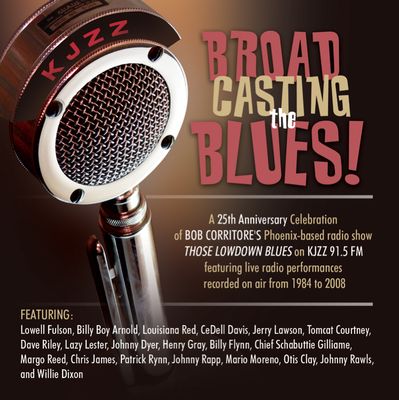
BROADCASTING THE BLUES
South West Musical Arts Foundation
?
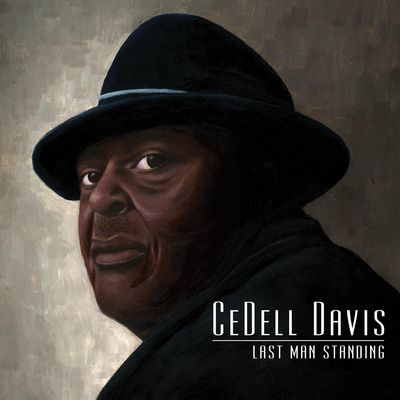
LAST MAN STANDING
Sunyata
2015
A 88 ans, Cedell fait son retour sur disque après une longue absence. Accompagné efficacement par Stu Cole (basse), Jimbo Mathus (guitare, claviers et production) et Barrett Martin (batterie et fondateur du label Sunyata), il se concentre surtout sur le chant. Sa voix est malheureusement parfois un peu faible. Cependant, la musique reste généralement bonne et fait de ce disque un choix tout à fait recommandable.
At 88, Cedell is back on disc after a long absence. Effectively accompanied by Stu Cole (bass), Jimbo Mathus (guitar, keyboards and production) and Barrett Martin (drums and founder of Sunyata label), he focuses mainly on singing. His voice is unfortunately sometimes a bit weak. However, the music remains generally good and makes this disc a choice quite recommendable.
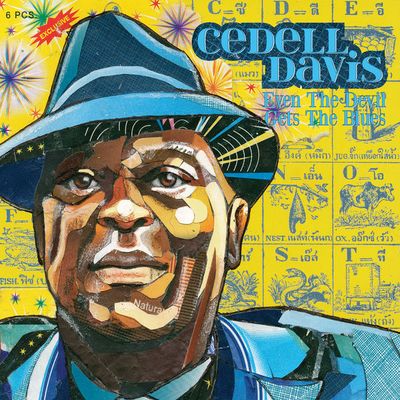
EVEN THE DEVIL GETS THE BLUES
Sunyata
2016
Toujours sous la supervision de Barrett Martin, cet album a été réalisé à Seattle avec la volonté de mélanger le Delta Blues de Cedell Davis à des éléments Jazz et Rock. Il y a plusieurs invités comme Mike Mac Cready (guitariste de Pearl Jam), Scott Mac Caughey (guitariste de REM) et même une petite section cuivres (Skerik, Dave Carter) du meilleur effet. "Play with your poodle" lance superbement le programme suivi par "Love blues", "Crap house bea", "Can't be satisfied", "Kansas City", "Catfish blues", "Ain't plannin' on dyin'". L'ensemble est vraiment sympathique même si Cedell semble absent de certains morceaux.
Still under the supervision of Barrett Martin, this album was made in Seattle with the desire to mix Cedell Davis' Delta Blues with Jazz and Rock elements. There are several guests like Mike Mac Cready (Pearl Jam guitarist), Scott MacCaughey (REM's guitarist) and even a small brass section (Skerik, Dave Carter) for the best effect. "Play with your poodle" superbly launches the program followed by "Love blues", "Crap house bea", "Can't be satisfied", "Kansas City", "Catfish blues", "Ain't plannin' on dyin'". The whole album is really nice even if Cedell seems absent from some tracks.